13 start with B start with B
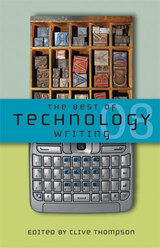
"No one covers technology with more insight or panache than Clive Thompson. I can't imagine anyone better qualified to curate this fascinating series."
---Chris Anderson, editor in chief of Wired magazine and author of The Long Tail
"Editor Clive Thompson suggests we are in a ‘golden age of technology journalism.' Reading this collection, one suspects he is right---it sparkles with beautifully written narratives not only about what technology can do for us but what it does to us as people, to our ways of thinking about ourselves, our relationships, and how we envisage our world."
---Sherry Turkle, Director, MIT Initiative on Technology and Self, Massachusetts Institute of Technology
The Best of Technology Writing 2008 proves that technology writing is a bona fide literary genre with some of the most stylish, compelling, and just plain readable work in journalism today.
The third volume in this annual series, The Best of Technology Writing 2008 covers a fascinating mix of topics---from a molecular gastronomist's recipe for the perfect gin and tonic; to "the Mechanism," an ancient Greek artifact that might be the world's first laptop computer; to social media, privacy, and what is possibly the biggest generation gap since rock 'n' roll.
Featuring contributions from
- Ted Allen
- Michael Behar
- Caleb Crain
- Julian Dibbell
- Cory Doctorow
- David Glenn
- Thomas Goetz
- Charles Graeber
- Alex Hutchinson
- Walter Kirn
- Robin Mejia
- Emily Nussbaum
- Ben Paynter
- Jeffrey Rosen
- John Seabrook
- Cass R. Sunstein
digitalculturebooks is an imprint of the University of Michigan Press and the Scholarly Publishing Office of the University of Michigan Library dedicated to publishing innovative and accessible work exploring new media and their impact on society, culture, and scholarly communication. Visit the website at www.digitalculture.org.

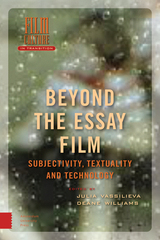
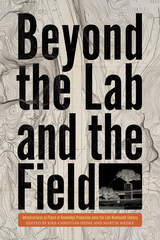
Beyond the Lab and the Field analyzes infrastructures as intense sites of knowledge production in the Americas, Europe, and Asia since the late nineteenth century. Moving beyond classical places known for yielding scientific knowledge, chapters in this volume explore how the construction and maintenance of canals, highways, dams, irrigation schemes, the oil industry, and logistic networks intersected with the creation of know-how and expertise. Referred to by the authors as “scientific bonanzas,” such intersections reveal opportunities for great wealth, but also distress and misfortune.
This volume explores how innovative technologies provided research opportunities for scientists and engineers, as they relied on expertise to operate, which resulted in enormous profits for some. But, like the history of any gold rush, the history of infrastructure also reveals how technologies of modernity transformed nature, disrupting communities and destroying the local environment. Focusing not on the victory march of science and technology but on ambivalent change, contributors consider the role of infrastructures for ecology, geology, archaeology, soil science, engineering, ethnography, heritage, and polar exploration. Together, they also examine largely overlooked perspectives on modernity: the reliance of infrastructure on knowledge, and infrastructures as places and occasions that inspired a greater understanding of the natural world and the technologically made environment.
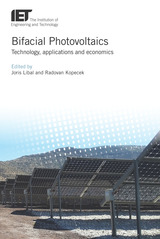
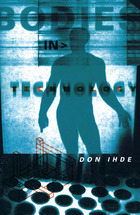
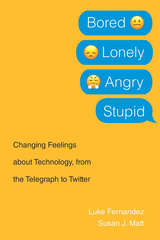
An Entrepreneur Best Book of the Year
Facebook makes us lonely. Selfies breed narcissism. On Twitter, hostility reigns. Pundits and psychologists warn that digital technologies substantially alter our emotional states, but in this lively investigation of changing feelings about technology, we learn that the gadgets we use don’t just affect how we feel—they can profoundly change our sense of self. When we say we’re bored, we don’t mean the same thing as a Victorian dandy. Could it be that political punditry has helped shape a new kind of anger? Luke Fernandez and Susan Matt take us back in time to consider how our feelings of loneliness, boredom, vanity, and anger have evolved in tandem with new technologies.
“Technologies have been shaping [our] emotional culture for more than a century, argue computer scientist Luke Fernandez and historian Susan Matt in this original study. Marshalling archival sources and interviews, they trace how norms (say, around loneliness) have shifted with technological change.”
—Nature
“A powerful story of how new forms of technology are continually integrated into the human experience.”
—Publishers Weekly

Brave New Digital Classroom deftly interweaves results of pedagogical research and descriptions of the most successful computer-assisted language learning (CALL) projects to explore how technology can best be employed in the foreign-language curriculum to assist the second language acquisition process.
Directed to all language teachers—whether at the school or the postsecondary level, with or without prior experience—this book focuses on how to use new technologies effectively. Blake urges teachers to move beyond a simple functional competence of knowing how to use the tools toward first a critical competence—realizing what the various tools are good for—and ultimately a rhetorical competence of knowing how the tools will help transform the learning environment. This book examines the effective use of a range of technologies, from Internet sites through computer-mediated communication such as synchronous chatting and blogs, to distance learning. At the end of each chapter questions and activities demonstrate the interactionist, learner-centered pedagogy Blake espouses.
An invaluable reference for experienced researchers and CALL developers as well as those of limited experience, Brave New Digital Classroom is also ideal for graduate-level courses on second language pedagogy. It will also be of interest to department chairs and administrators seeking to develop and evaluate their own CALL programs.
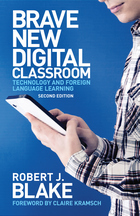
Brave New Digital Classroom examines the most effective ways to utilize technology in language learning. The author deftly interweaves the latest results of pedagogical research with descriptions of the most successful computer-assisted language learning (CALL) projects to show how to implement technology in the foreign language curriculum to assist the second language acquisition process.
This fully updated second edition includes new chapters on the latest electronic resources, including gaming and social media, and discusses the realities and potential of distance learning for second language acquisition. The author examines the web, CALL applications, and computer-mediated communication (CMC), and suggests how the new technologically assisted curriculum will work for the foreign-language curriculum. Rather than advocating new technologies as a replacement for activities that can be done equally well with traditional processes, the author envisions a radical change as teachers rethink their strategies and develop their competence in the effective use of technology in language teaching and learning.
Directed at all language teachers, from the elementary school to postsecondary levels, the book is ideal for graduate-level courses on second language pedagogy. It also serves as an invaluable reference for experienced researchers, CALL developers, department chairs, and administrators.

Robert Blake, now with Gabriel Guillén, updates his successful book (1st ed. 2008, 2nd ed. 2013) on how to teach foreign languages using technology. Brave New Digital Classroom touches on all of the key concepts and challenges of teaching with technology, focusing on issues specific to FLL or L2 learning and CALL. Originally referred to as computer-assisted language learning, CALL has come to encompass any kind of learning that uses digital tools for language learning.
This edition reframes the conversation to account for how technology has been integrated into our lives. Blake and Guillén address the ways technology can help with L2, how to choose the right digital tools, how to use those tools effectively, and how technology can impact literacy and identity. The book is primed for use in graduate courses: terminology is in bold and a comprehensive glossary is included; each chapter finishes with a short list of references for further reading on the topic and discussion questions. The authors provide short interview videos (free via GUP website) to enhance discussions on each chapter’s topic.
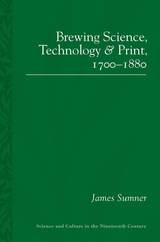
From an oral culture derived from home-based skills, brewing industrialized rapidly and developed an extensive trade literature, based increasingly on the authority of chemical experiment. The role of taxation is also examined, and the emergence of brewing as a profession is set within its social and technical context.
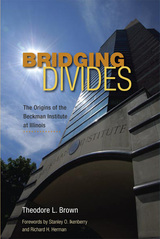
The book follows the progress of the Beckman Institute's creation, from the initial conceptualization of a large, multi-disciplinary institute; through proposal formulation; to the architectural design and actual construction of its state-of-the-art building, made possible by the largest gift made to any public university at the time: a $40 million contribution from Illinois alumnus and founder of Beckman Instruments, Inc., Arnold O. Beckman and his wife Mabel M. Beckman.
Theodore L. Brown, the founding director of the Beckman Institute, brings an insider's personal perspective on its conception and its early operations. The evolution of a physical facility that matched a developing sense of what multidisciplinary and interdisciplinary research might be was a vital ingredient in the Institute's development. In addition, because the Institute represented a dramatic departure from traditional university organization, many challenges involving its administration and faculty had to be overcome.
A celebration of the Beckman Institute's first twenty years of operation since the building's completion in 1989, Bridging Divides provides an informative look back at the history of this groundbreaking interdisciplinary research center. The book also includes forewords by Stanley O. Ikenberry, former president of the University of Illinois, and Richard H. Herman, chancellor of the University of Illinois at Urbana-Champaign.
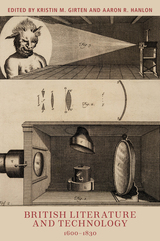
Enlightenment-era writers had not yet come to take technology for granted, but nonetheless were—as we are today—both attracted to and repelled by its potential. This volume registers the deep history of such ambivalence, examining technology’s influence on Enlightenment British literature, as well as the impact of literature on conceptions of, attitudes toward, and implementations of technology. Offering a counterbalance to the abundance of studies on literature and science in seventeenth- and eighteenth-century Britain, this volume’s focus encompasses approaches to literary history that help us understand technologies like the steam engine and the telegraph along with representations of technology in literature such as the “political machine.” Contributors ultimately show how literature across genres provided important sites for Enlightenment readers to recognize themselves as “chimeras”—“hybrids of machine and organism”—and to explore the modern self as “a creature of social reality as well as a creature of fiction.”
READERS
Browse our collection.
PUBLISHERS
See BiblioVault's publisher services.
STUDENT SERVICES
Files for college accessibility offices.
UChicago Accessibility Resources
home | accessibility | search | about | contact us
BiblioVault ® 2001 - 2024
The University of Chicago Press









